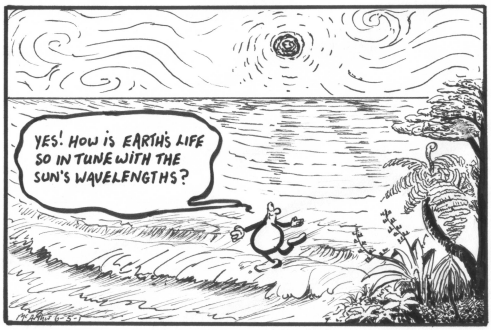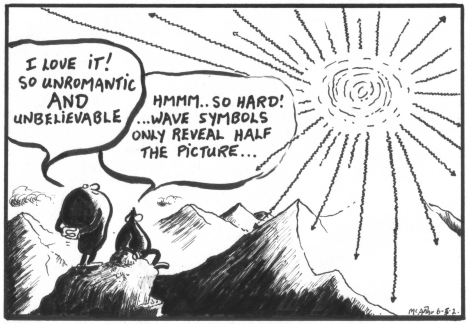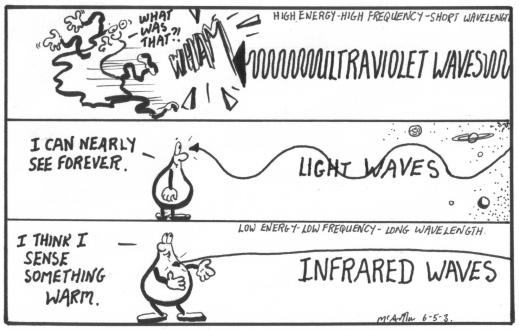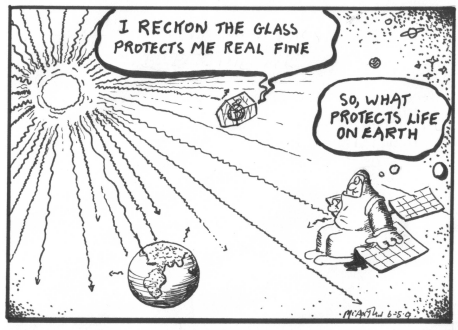| Bonus
Joules and the Knowledge Economy
|
||||||
|
|
Catching the Waves Click on any cartoon Chapter Six - Land of the Lost Trace Gases -Life and Death in the Waves. Bonus Joules and the Knowledge Economy: All content on this site is copyright 2001 and you are free to use it with care.
Blog by Dave McArthur 30 April 2009 Have you ever
asked what we are really commemorating in New Zealand and Australia on
ANZAC Day? I recently did and the answer I found has a shocking message
for us. People from other
lands should know from answers.com
: “Anzac is by turn an
acronym, a place, a day of commemoration, and a cultural force. During
the preparations for the Gallipoli
landings the term was coined as ‘telegraphese’ to describe the
Australian and New Zealand Army Corps commanded by Birdwood.
The stretch of Turkish coastline where the Australians and New
Zealanders had gone ashore quickly became known as Anzac Cove, and the
whole of their position as ‘Anzac’, while the men themselves were
known as ‘Anzacs’; this was underpinned with the subsequent issue of
a small letter ‘A’, sown on the colour patch, worn by all survivors
of the campaign. Anzac Day, 25 April, was first observed in Egypt,
London, and Australia in 1916 and has evolved into Australia's true
(though unofficial) national day. It is marked by solemn services at
dawn and a march of veterans
later in the morning and continues at the end of the 20th century to
draw increasingly large crowds in attendance. The article goes
on to point out that the ANZAC experience helped define Australia as a
nation. Here in New Zealand it has been described as the birth of our
nation. Indeed over my lifetime I have read and heard many hundreds of
accounts of the misery, the slaughter and the bravery of “our boys”
at Gallipoli. Clearly they lived and died in a hellhole. The image of
the bodies a young Turkish man and “one of our boys” propped up in
death against each other, riveted in upright position by the bayoneted
guns they had rammed through each other’s hearts is ever a reminder to
me that Turkey too experienced great losses at the hands of the
invaders. Every year of my
life there have been the analyses of the military strategies, and the
defining role ANZAC plays in our culture. However though I have asked
many people I have never had an adequate explanation of why our young men would
leave their families, farmlets and manawa (heartland) to travel
10,600.miles,(17,100 kilometers) across
the face of the planet to fling themselves in suicidal fashion at cliffs
bristling with high power machine guns in an attempt to invade a country
that few knew anything about. I knew these were
literate men driven by ideals of defending the British Empire and
freedom. Indeed US
observers, noting how these men could be motivated to fight against
formidable odds, realised it was their literacy that enabled them to be
inculcated with the motivating ideals. The ANZACs fought where
lesser-educated men would have fled. Thus literacy became a prime
requirement of the US armed forces. When I dig below
the superficial reasons for wars given in popular histories I almost
invariably find the cause is the demented ambitions of a few individuals
and or the fatal failures to respect the ecological balances that
sustain us. So exactly what were the ANZACs really fighting for when we
attempted to invade Turkey? I knew the Suez Canal had strategic value in the British-New Zealand trade but the opening of the Panama Canal reduced its importance and many ships still preferred the Cape Horn route. Though I knew Homo sapiens are quite capable of engaging in slaughter just for the sake of it I figured there had to be something of even greater strategic value. This Now readers of my
blogs will know I believe that if our current abuse of our carbon
potential continues then a catastrophic global war will occur, perhaps
as soon as 2013. The abuse is summed up in this fatally flawed equation
that our culture has embraced: “Energy
= fossil fuels (including mineral oil/gas) and Bulk-generated
electricity”. As a result we
use mineral oil as though it is as bounteous as energy and thus place a
negligible price on it. Our vast undervaluation of this extraordinary
resource is manifest as a price of $US50 a 42 gallon barrel. Indeed most
of our credit, health, food, transport, housing and other systems are
based on a valuation of $US25 a barrel, which equates to about 0.1 cent
a manhour labour of the energy equivalent of the resource. This
calculation assumes each barrel contains the energy equivalent of about
25000 man-hours of labour. In the past generation we have flared off about a trillion barrels of this extraordinary resource, much of it in deliberately wasteful devices like cars, trucks, jets, poorly insulated dwellings etc. Now the enormous wealth inherent in that 25000 trillion manhours of labour is now simply air pollution. Worse -our population has exploded four fold in as many generations on the basis of this abuse of our carbon potential. Its a giant Ponzi scheme because everlasting mineral oil at even S10,000 a barrel never existed. I knew
our addictive use of mineral oil has been a key driver of almost every
recent war, including World War 11. So I did a search on the web asking
these key words: “oil cause
world war one WW1 turkey” I did a mental bet $2 (an icecream for me) to $30 (a donation
to a charity) that addictive uses of mineral oil was a root cause. Top of the list
is this article Oil
and the origins of the By F. William Engdahl, 22 June, 2007 I relish a fine
icecream but I will not really enjoy my next one
because I really did not want my surmise about the role of
mineral oil/gas in the Gallipoli slaughter to be correct. It only
supports my general hypothesis that I alluded to earlier: if we continue
to flare off remaining reserves of easily extracted mineral oil/per
capita over the next couple of years at the current rate then our
current systems will further implode with a very high risk of global
warfare. F William
Engdahl’s article can teach us a lot and I recommend it. The power of
combusted mineral oil is made apparent. From 1882 “..
Britain's Admiral Lord Fisher… argued the qualitative superiority of
petroleum over coal as a fuel. A battleship powered by diesel motor
burning petroleum issued no tell-tale smoke, while a coal ship's
emission was visible up to 10 kilometers away. It required 4 to 9 hours
for a coal-fired ship's motor to reach full power, an oil motor required
a mere 30 minutes and could reach peak power within 5 minutes. To
provide oil fuel for a battle ship required the work of 12 men for 12
hours. The same equivalent of energy for a coal ship required the work
of 500 men and 5 days. For equal horsepower propulsion, the oil -fired
ship required 1/3 the engine weight, and almost one-quarter the daily
tonnage of fuel, a critical factor for a fleet whether commercial or
military. The radius of action of an oil-powered fleet was up to four
times as great as that of the comprable coal ship.[13] “
William argues “ By
the first decade of the 20th Century securing long-term
foreign petroleum security had become an essential factor for British
grand strategy and its geopolitics. By 1909, a British company,
Anglo-Persian Oil Company held rights to oil exploration in a 60-year
concession from the Persian Shah at Maidan-i-Naphtun near the border to
Mesopotamia. That decision to secure its oil led England into a fatal
quagmire of war which in the end finished the British Empire as the
world hegemon by Versailles in 1918, though it would take a second World
War and several decades before that reality was clear to all.” “…The Sultan, Abdul Hamid II, on November 27, 1899, awarded Deutsche Bank, headed by Georg von Siemens, a concession for a railway from Konia to Baghdad and to the Persian Gulf. In 1888 and again in 1893, the Sultan had assured the Anatolian Railway Company that it should have priority in the construction of any railway to Baghdad. On the strength of that assurance, the Anatolian Company had conducted expensive surveys of the proposed line. As part of the railway concession, the shrewd negotiators of the Deutsche Bank, led by Karl Helfferich, negotiated subsurface mineral rights twenty kilometers to either side of the proposed Baghdad Railway line.[22] Deutsche Bank and the German government backing them made certain that included the sole rights to any petroleum which might be found. The Germans had scored a strategic coup over the British, or so it seemed. Mesopotamian oil secured through completion of the Berlin-Baghdad Railway was to be Germany’s secure source to enter the emerging era of oil-driven transport.” William makes clear that the British response was elaborate “Britain
and British intelligence was active in the Balkans stirring revolt and
opposition to Constantinople’s rule. The Entente Powers—France,
England and Russia-- knew that despite all her efforts, Germany did not
have strong cards in the Balkans. And the Balkans constituted a
strategic link between Berlin and Baghdad as a glance at a good
typographical map reveals.” He quotes Major
R.G.D. Laffan who was in charge of a British military training mission
in Serbia (senior British military adviser attached to the Serbian Army)
just before the war. "A glance at the
map of the world will show how the chain of States stretched from Berlin
to Baghdad. The German Empire, the Austro-Hungarian Empire, Bulgaria,
Turkey. One little strip of territory alone blocked the way and
prevented the two ends of the chain from being linked together. That
little strip was Serbia. Serbia stood small but defiant between Germany
and the great ports of Constantinople and Salonika, holding the Gate of
the East...Serbia was really the first line of defense of our eastern
possessions. If she were crushed or enticed into the 'Berlin-Baghdad'
system, then our vast but slightly defended empire would soon have felt
the shock of Germany's eastward thrust." William observes: “Ironically, just on the eve of the
assassination of the Austro-Hungarian Archduke and heir to the Habsburg
throne in Sarajevo by Gavrilo Princip, a member of a Serbian Black Hand
secret society with reported French Masonic ties, agreements were
finally reached between the Germans, the British and the Turkish parties
over oil rights in Mesopotamia.” I fail to
understand the irony that William alludes to. The overwhelming evidence
of the geopolitics of our abuse of mineral oil points to the
assassination being a planned event. It certainly did not occur in a
vacuum. Similarly I was
taught all my life that the Japanese bombing of Pearl Harbour happened
“out of the blue”. Again a search on “oil Japan Pearl Harbour”
reveals that five months before the bombing the US, Britain and Holland
had imposed an embargo on Japan, reducing its mineral oil imports by
90%. My point is that
we allow the power of mineral oil/gas to dement us, to demind us and
destroy our sense of the potential in life. For example, if you drive
cars and trucks and fly in jets there is a high probability you believe
it is your God-given right to destroy remaining mineral oil reserves in
these devices that are designed to maximise the wasteful use of this
fantastic and very finite resource. It never occurs to you that you are
destroying a fantastic resource that may have occurred once in one small
unique epoch of this planet and may no exist anywhere else in our
galaxy. In that unquestioned belief of your absolute right to destroy
mineral oil in most wasteful ways is the
seeds of the inevitable catastrophic destruction of the current global human
civilisation. On ANZAC day
there is much talk of honouring those who made the supreme sacrifice and
ensuring that they did not die in vain. And yet no one talks of the real
reasons why they died. One of those
reasons was to enable our generation to remain “free” to sit in
highly inefficient devices call cars in traffic jams that often exist
along side barely used railway lines. (And remember we were fighting at
ANZAC to stop a railway line being constructed.) Another reason was
so that we remain “free” to flare off remaining mineral oil reserves
on scale blasting through the atmosphere in jets so we can sit on a
beach for a few days or trade some ephemera or visit some shrine or
relatives or “save the world”. The acid test is
to ask, “Would I still do these activities if I had to spend my
personal time travelling around the globe by the far more efficient ship
mode? The honest answer is that many of us would rather save a month of
our time even if it means destroying lifetimes of possibilities for our
children. While we deny
these reasons we cannot begin to ensure “our boys” did not die in
vain for their more noble ideals. We cannot begin to contemplate how we
can avoid future global slaughter as our access to easily extracted
mineral oil/gas reserves diminishes. There is a truth
in the notion that ANZAC day celebrates the birth of our modern nations.
It is not as most perceive it – the time when New Zealand and
Australia provided army corps that fought and died as equals with the
Motherland (Britain) and it thus signalled we were now independent
Dominions. Rather ANZAC Day signals the advent of new economies founded
in profoundly wasteful uses of mineral
oil in all our systems – agriculture, trade, transport, education,
health, manufacturing etc. And ANZAC Day
2009 will come to be seen as the year that these unsustainable economies
embarked on a desperate borrowing binge to stave off the inevitable
implosion that will occur for those nations that make addictive use of
mineral oil/gas. Of course, just as our schools, media, economists and politicians
never taught us the real reasons behind the Gallipoli tragedy so it is
now they are not telling us the real reason for the economic implosion
that is occurring. I remain hopeful
that those men, who have been described as “the flower of our youth”,
will not have died in vain for their finer aspirations. Many died
fighting for lofty ideals such as freedom, caring and protecting our
young and our elderly and for love of their country. I am not denying
the beauty of their aspirations when I suggest that they were really
fighting and dying so their nations could flare off mineral oil on
scale. I am simply saying even the noblest of intentions can be
subverted by evil power players if we are not alert. My respect for
them is very difficult to communicate, especially in a culture that uses
and abuses our carbon potential as ours does. It so happens that the
following email arrived on ANZAC Day. Dear Dave, I had sent WWF-International a note with a link to my last blog. The blog includes
photos of my cottage lit up like a beacon during the Earth Hour Blackout
and I explained why I believed the WWF campaign was unhelpful, if not
dangerous. As I perused the
"success story" pages of the WWF my mind was simultaneously filled with
images of our young men on the beaches and cliffs of Gallipoli,
gallantly, even heroically, giving their all in defence of freedom and
all that is good. At the same time these images were interspersed with
visions of the well-intentioned folk in WWF striving valiantly and
generously to save endangered species and conserve vital resources such
as our air, water and soils. Indeed their activities are inspiring and
each is as a beautiful butterfly. However just as
the ideals and endeavours of our young men at Gallipolli were harnessed
to serve the terrible greed of a few mineral oil/gas merchants so too
have these merchants colonised the wonderful ideals of the WWF folk. The
“butterfly effect” of the WWF has been framed and channeled to
serve the short-term interests of a callous elite of individuals who
care nought for the balances and flows of the air, waters and soils that sustain humanity. I remain keenly
aware that I cannot know what good comes from bad and what bad comes
from good. I am constantly confronting the painful reality that my
well-intentioned actions may well have had unhelpful consequences. This
is the dance of science. This is the compassionate spirit with which I
observed and reflected on the WWF “Blackout = stewardship” campaign.
Their kind letter leaves me wondering how carefully the WWF read my blog
and if they followed the links to, for instance, The
Sustainability Principle of Energy? If they did, I
suspect the response would be different. The Sustainability Principle
suggests some of their key campaigns such as PowerSwitch and their
equation of stewardship with “black outs” put us all at greater risk
and work directly against the stated objectives of the organization. All
their fine intention is framed and levered off by the psychopathic
agencies. The good WWF folk are courageously fighting battles in a war
in which they may well be their own worst enemy. Talking wars,
fifteen people died on our motorways this ANZAC weekend and many times
that number lie burned, broken and torn apart in our hospitals. New
Zealand’s top road policing officer described our motorways as
“killing fields” and I heard people like Jim Mora on Radio NZ
National radio suggest this use of the symbol is being a bit extreme.
Jim is a good and thoughtful person. However even he seems to fail to
grasp the basic physics of our plight. The physics of the situation is that if we abuse our carbon potential, as we do with mineral oil, then we pay the price. War is inherent in that abuse. For instance we undervalue mineral oil at our peril. We can learn of
the social impacts when petrol is valued at even $2 a litre. Last year when
the global price was over $US100 a barrel the slaughter on New Zealand
motorways was literally halved to 20 fatalities a month. Or, for the
benefit of Government officials searching to slash Government spending,
the nation saved over $NZ60 million a month, using a valuation of $NZ3.35
million per life. That could fund a lot of nurses at a time when
we are at risk of a so-called swine or agricorp flu pandemic and when graduate nurses are so
stressed in our hospitals that they giving up before they have barely
started their careers. So imagine what could happen if we removed the
vast subsidies off our wasteful uses of mineral oil and used the funds
instead to insulate homes and make them more self sustaining, to develop
intelligent uses of our electrical potential, to build safe, fast and
reliable mass transit systems and to make other life enhancing
investments. Similarly, to the extent our ANZAC boys died so we may live then they died in vain while we refuse to use mass transit system and persist with brutal speed regimes on our motorways. We see the safety campaigns and refuse to accept and live their wise insights. For instance: "A 1km/h decrease in average speed results typically in a 3% decrease in road crash frequency. (Source: European Transport Safety Council) The higher the impact speed, the greater the likelihood of serious and fatal injury. For car occupants in a collision with an impact speed of 80km/h (50mph), the likelihood of death is about 20 times that at an impact speed of 30km/h (20mph).
About 30 years I
looked at the psychology of car use and observed in a letter to my local
Christchurch broadsheet that the media’s use of the “accident”
symbol suggested car crashes happen without human cause – we denied
our role in them by describing them as simply “accidents” of fate.
To my surprise the letter generated some national debate and the use of
the “accident” symbol was dropped in favour of the “crash”
symbol. Perhaps it is
time now to acknowledge that our motorway deaths are a national war
policy in the same way that it is national policy when we send our young
people in our Armed Forces to fight and die so we can access cheaply
extracted mineral oil/gas from foreign lands. Headlines will read, “ 500
deaths from national Motorway Wars policy this year”, “10 die for
National 100 Kph Policy” and “Carnage from our Addictive Use of
Mineral Oil Continues –10,000 deaths since 1990.” The latter
headline may help us begin to face the reality that the death rate from
our addictive use of mineral oil is about to become truly calamitous if we do
not acknowledge and ameliorate our behaviour. We either break the
behaviour pattern or we self-destruct in an exponentially vicious war
over remaining mineral reserves. Visit any small town in New Zealand and you will find a prominent structure is a “war memorial” commemorating those who “died fighting for their country”. Often there are multiple names from one family. However nowhere do we find memorials commemorating those who died for our mineral oil addict economy and the few who are the prime beneficiaries of the wastage and carnage. The stats are revealing: ..”
new
research by Hamilton author Richard Stowers suggests that 19.8
per cent of New Zealanders who served on the Anzac escarpment lost their
lives. By comparison the
injury rate on the New Zealand motorway killing fields each year is
about 15000 people. And the
social costs of all these injuries over the last decade?
The Ministry of Transport puts that at about $NZ36 billion. I
suggest we declare a national holiday dedicated to all those who gave so
much on our motorways and the day be dedicated to reviewing how we can
transition beyond this insane Cheap Mineral Oil/Gas era in which lives
are accorded a price but little or no value. Footnote. Dave
|
|
||||




